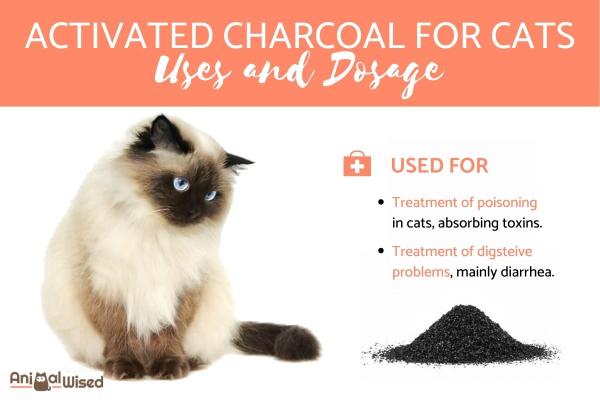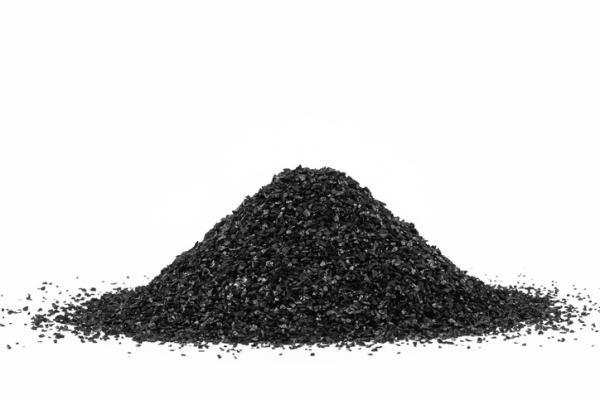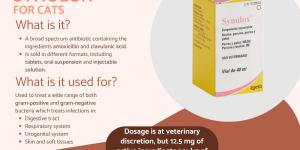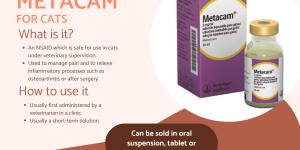Activated Charcoal For Cats - Uses & Dosage



See files for Cats
There are certain products we need to keep on hand in any first aid kit. They are used to treat minor injuries and to help prevent emergencies. What we keep in them differs between animals and humans, although there are similarities. One product many people overlook is activated charcoal. This is a growingly commonplace product which is used to treat poisoning in cats, something which is relatively common to varying degrees.
At AnimalWised, we look at the uses of activated charcoal for felines, understand how it is administered and when it should and should not be used. Essentially, we give you everything you need to know about activated charcoal for cats.
What is activated charcoal?
Activated charcoal, also known as activated carbon, is a medication obtained from various carbon-roch materials. These can include a range of organic materials including coconut shells, walnut shells and coal. Depending on its preparation, it may present different characteristics.
New sources are being investigated regularly. For example, olive pits have recently been discovered to be potentially useful in activated carbon production, especially since they can make use of agricultural waste[1]. The reason these materials are used is because of their high adsorbent properties when made into activated charcoal for cats. The substances the charcoal adsorbs are varied, but due to its micro-pore structure it can adsorb many microbes including toxins.
This is why activated charcoal has become so useful in treating poisoning in cats. This process is known as adsorption, but it is more accurate to consider it a chemical process whereby the activated carbon adheres to other atoms, ions or molecules which could have been introduced in liquid, solid or gaseous form. This is why activated charcoal for cats will be effective when the ingested substance is in the stomach.

Uses of activated charcoal for cats
While some may claim miraculous benefits of charcoal for cats, medical use of activated charcoal is mainly for acute poisoning. Since it needs to be used within an hour of ingestion of the toxic substance, it is considered a part of feline first aid medical intervention.
However, activated carbon has also been proven useful in treating certain gastrointestinal problems, but it is not suitable for all. In fact, it can be dangerous if used inappropriately, as we will see in the section below on contraindications. Use of activated carbon for cats should only be used when prescribed by a veterinarian.
The mechanism of action in veterinary medical use is due to its adsorbent qualities. When ingested, the activated charcoal detoxifies the substance by adsorbing the microbes and preventing them from being absorbed into the cat's body. The effectiveness of activated charcoal for cats will depend on three major factors:
- How much toxic substance has been ingested.
- The level of toxicity of the ingested substance.
- How long after ingestion the activated carbon is administered.
Logically, due to its action mechanism, if we administer activated charcoal after the cat has absorbed the toxic substance, it will not be effective. If we discover our cat has ingested something toxic or we suspect they have been poisoned, we should call the veterinarian immediately. This is because the cat may require the induction of vomiting before using activated charcoal, something which is not recommended in all cases and may even be counterproductive.
Should we make an intoxicated cat vomit?
On the internet, we can find different techniques to induce vomiting in cats. The most widespread is giving a solution of hydrogen peroxide at a concentration of 3%. It is usually administered with a tablespoon of the solution, but may be repeated after 15 minutes if it has not initially taken effect.
However, many researchers have pointed out that ingestion of hydrogen peroxide can result in hemorrhagic gastritis in cats. Other ways to make a cat vomit include administration of salt water, but this can result in hypernatremia, a high concentration of sodium in the blood. For this reason, we should only induce vomiting in cats if we are told to be a veterinarian and should take the cat to an emergency clinic in most cases[2].
Dosage of activated charcoal for cats
Once the cat has vomited, activated charcoal can be administered according to the manufacturer's instructions. The dosage will correspond to the weight of the animal. Activated carbon can be purchased in tablet form, liquid or as a powder to dilute in water. The latter is the most recommended and effective In general the dosage for cats is 1-5 g per kilo of weight. In a solution, it is around 6-12 ml per kilo of cat's weight. If the veterinarian considers it necessary, it can be administered more than once. It may also be administered via gastric intubation.
If we administer activated charcoal to our cat, we still need to take them to a veterinarian. We will only give activated carbon in case of acute toxicity, so the veterinarian will need to examine the animal and assess if there is any extensive damage. They may also need to administer further treatment or manage the symptoms.
In cases where activated charcoal has been administered as a treatment for digestive disorders, the veterinarian will need to decide the appropriate dosage. This will depend on the cat's symptoms, but it is important to know the effects of activated charcoal on digestive issues are not well known and other treatments may be more effective.
Contraindications of activated charcoal for cats
We have seen how effective activated charcoal can be for poisoning in cats, but it is still very important to contact your veterinarian. The reason is that their clinical picture might mean administration could cause a negative reaction. Specifically, activated charcoal should not be given to cats due to the following contraindications:
- When the ingested product is a cleaning product, a product derived from petroleum or if the label indicates vomiting should not be induced. Wounds in the cat's mouth can make us suspect the cat has ingested a corrosive poison, in which case they should not be made to vomit.
- The cat has already vomited.
- They are practically unconscious.
- The cat has trouble breathing .
- Shows signs of neurological disturbances, such as incoordination or tremors.
- They are severely weakened.
- The ingestion has taken place more than 2-3 hours prior.
- Activated carbon is not effective with all substances. For example, heavy metals, xylitol and alcohol do not bind to it. It is also not recommended if the cat is dehydrated or has hypernatremia.

Side effects of activated charcoal in cats
In general, activated charcoal does not have side effects because it is not absorbed or metabolized by the body of the feline. The charcoal will be eliminated in the feces, so we can see their stools will be completely black. This should not be confused with blood in the cat's feces, although it is possible there will be digested blood also due to the intoxication
However, if it is not administered properly, especially with a syringe, the cat could aspirate it. This means it enters the lungs, something which can lead to:
- Pneumonia
- Hypernatremia
- Dehydration
If your cat has ingested something they shouldn't, it is possible the result will be fatal. The cat should be taken to a veterinarian immediately and we need to be observant for any signs your cat is dying.

This article is purely informative. AnimalWised does not have the authority to prescribe any veterinary treatment or create a diagnosis. We invite you to take your pet to the veterinarian if they are suffering from any condition or pain.
If you want to read similar articles to Activated Charcoal For Cats - Uses & Dosage, we recommend you visit our Medicine category.
1. Bohli, T., Abdelmottaleb, O., Fiol, N., & Villaescusa, I. (2016). Evaluation of an activated carbon from olive stones used as an adsorbent for heavy metal removal from aqueous phases. Comptes Rendus Chimie, 18(1), 88-99.
https://www.sciencedirect.com/science/article/pii/S1631074814001477
2. Borrell, R. F., & Rubio, R. A. (2016). Novelties in the emergency management of the poisoned patient. Argos, 180, 36-39.
https://dialnet.unirioja.es/servlet/articulo?codigo=7223160
- Editorial Team. (2017). Small Animal Toxicology. Veterinary Portal.
- Zeinsteger, P. A., & Gurni, A. A. (2004). Toxic plants that affect the digestive system of canines and felines. Rev. vet, 15(1), 35-44.
https://revistas.unne.edu.ar/index.php/vet/article/view/2011








